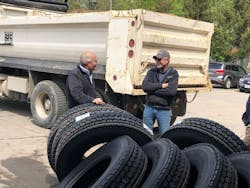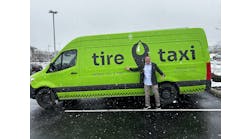This MTD exclusive was provided by Michael McGregor, a partner at Focus Investment Banking LLC.
As commercial tire dealers look to enhance their business values into the same stratosphere as retail tire dealers, some are looking at integrating the more profitable elements of retail business into their commercial operations.
From a customer retention and profit perspective, this makes perfect sense. The more touch points you have with a customer, the more value you add and the greater customer loyalty you’ll enjoy.
The challenge is doing this without taking your eye off your core commercial business. After all, it’s tough enough being good at one business, let alone two or three.
Many commercial tire dealers offering heavy or medium-duty truck and OTR/ag tires do some sort of retail business already. If you don’t, but want to, think about taking an incremental, step-by-step approach until you are satisfied with what you have.
Don’t fundamentally change who you are and what you do. And go after the low- hanging fruit.
In terms of what to go after for retail-like business, I’d take it in this order:
-
Passenger and light truck vehicles that are part of your existing customer’s fleet. You already have a relationship with the company and the work is already billed monthly;
-
Personal vehicles owned by drivers of a customer’s commercial vehicles. Let the drivers know that they can bring their family’s vehicles in for tires and service and that you’ll give them a discount;
-
The personal vehicles owned by all other employees of your customer. Spin it as an employee benefit and that all employees will get a special discount, and;
-
Other business services companies in your trade area that have fleets of vehicles, like light construction, plumbing, glass, delivery or landscaping operations. Offer special pricing and monthly billing.
Now for the “how-to.” Think about what you do already and see how you can integrate retail into that. Focus on these areas:
Products and services. You’ll likely start with tires, tire-related services, brakes, alignments and undercar services. It goes without saying that you’ll need the proper equipment and qualified technicians who can do those services. Think twice about getting into drivability because of the higher cost and potential downside.
Price. You can’t be priced higher than where tire and service retailers in your area are. That administrative assistant to the CEO needs to feel that she got a great deal, too. (You’ll hear about it if she feels otherwise.) Start with 10% off the normal retail price in the area and see how that goes. Make sure you can take Visa and Mastercard and that you have a cash drawer.
Place. Make your facility as conducive to retail business as you can. Hopefully you can dedicate a couple of service bays to this new business. You’ll need a front counter where customers can be greeted, clean bathrooms and a customer waiting area. Do the best that you can to make the commercial facility as pretty as a retail facility. Regarding store hours, don’t change them. The idea is to integrate this into your existing business. If you’re open five days a week and are closed Saturday and Sunday, stay that way. Altering it can have a significant impact on your economics and employee morale.
Promotion. This new business can be built with grassroots marketing. Your salespeople should be happy to get the word out, especially if they are commissioned on the business. Maybe print up discount cards for your salespeople to hand to employees when they see them. Don’t advertise retail at first, other than on your website. And please, no loss leaders. Promote quality.
People. A friend of mine who used to run groups of TCI Tire Centers always integrated retail into his commercial operations. He’d take the least productive commercial salesperson and find a better replacement, put him behind the counter and place him in charge. His thinking was that the guy understood commercial tires and the importance of treating everyone well because one never knew who that “retail” customer might truly be.
Process. This same friend got everyone’s attention in the store when launching retail by having a full store employee meeting after hours. You’ll have to come up with a process that is more like the traditional retail process so customers can get in, get serviced and get cashed out the same day.
My experienced commercial buddy doesn’t call this business “retail,” by the way. He calls it “commercial light mechanical service” and he feels that it’s better than “regular retail” because the customers are generally nicer.
Both parties realize the business relationship is important. Customers trust you already and will give you the benefit of the doubt.
Michael McGregor is a partner at Focus Investment Banking LLC (focusbankers.com/tire-and-service) and advises and assists multi-location tire dealers on mergers and acquisitions in the automotive aftermarket. For more information, contact him at [email protected].
In this exclusive video, McGregor discusses what you should know about tax change uncertainty:


